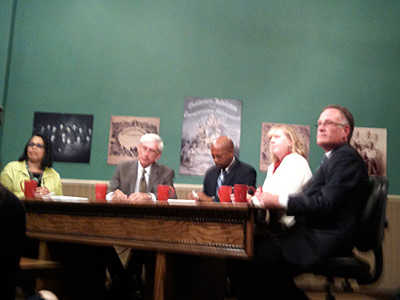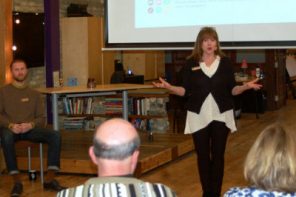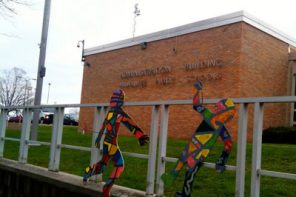If the current system for funding Wisconsin public schools does not change, the gap between rich and poor school districts will grow.
That was the consensus among panelists Thursday afternoon at the “4th Street Forum” discussion, moderated by Denise Callaway, titled, “Political Dynamite: Paying for Wisconsin’s Schools.”
The event — which included State Superintendent of Public Instruction Tony Evers, Common Council president Willie Hines, Public Policy Forum research director Anneliese Dickman and Greendale School District superintendent William Hughes — will air on MPTV on Oct. 1 and 3.
While there was nothing especially explosive about the civil discussion Thursday, Hughes did point out that one of the main ways to draw a crowd at a school board meeting is to discuss the property tax levy.
But in addition to public opinion and angry taxpayers, school funding change is also thwarted by the fact that the State Supreme Court has ruled that the current formula for funding Wisconsin schools is equitable.
Battling that decision isn’t really an option right now, said Hughes, who noted that fight could take years.
“The public is done listening,” said Hughes.
“The old ways aren’t working,” he said, adding that new funding methods need to be met with new ways of allocating resources.
That reinforced Hines’ opening remarks, who questioned the idea of funding all children at the same level, regardless of their individual needs. Hines also said that a major issue is not simply the source of funds, but the way those resources are used by districts.
Interestingly, there was not a teacher or teachers’ union bash to be heard. In fact, the reverse was true.
Hines said, “teachers are part of the solution and have to feel a part of (the process).”
The teachers’ union wants what is best for the children, said Hughes, who also commented on bright spots in Milwaukee.
“There is a lot of excellence going on in MPS,” he noted.
When an audience member asked about Race to the Top, Evers noted that while the financial gain to the state from the federal program was zero, the state did benefit from the kind of discusses that took place in preparing Wisconsin’s application for those funds.
Among the fairly large crowd were at least two Milwaukee alderman: Ashanti Hamilton and Nik Kovac.


 i evaluate to yes even if there's no image
i evaluate to yes even if there's no image  i evaluate to yes even if there's no image
i evaluate to yes even if there's no image  i evaluate to yes even if there's no image
i evaluate to yes even if there's no image  i evaluate to yes even if there's no image
i evaluate to yes even if there's no image  i evaluate to yes even if there's no image
i evaluate to yes even if there's no image  i evaluate to yes even if there's no image
i evaluate to yes even if there's no image 